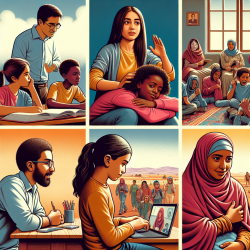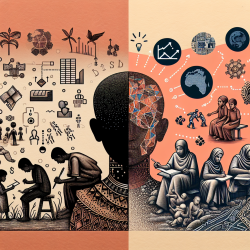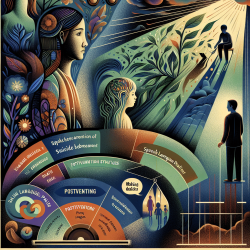Introduction
In the realm of special education, understanding the nuanced factors that influence the mental health and self-esteem of adolescents is crucial. A recent study titled "How gender- and violence-related norms affect self-esteem among adolescent refugee girls living in Ethiopia" provides valuable insights into how social norms impact self-esteem among vulnerable populations, particularly adolescent refugee girls. This blog explores how practitioners can leverage these findings to enhance their skills and support these adolescents effectively.
Key Findings from the Research
The study conducted by Stark et al. (2018) highlights the significant role that collective peer norms and perceived injunctive norms play in shaping self-esteem among adolescent refugee girls. The research utilized the Rosenberg self-esteem scale to measure self-esteem levels and examined the influence of personal attitudes, perceived injunctive norms, and collective peer norms on self-esteem.
- Personal attitudes toward gender inequitable norms were not significantly predictive of self-esteem.
- Collective peer norms surrounding gender inequity were significantly predictive of lower self-esteem.
- Perceived injunctive norms related to family and community reactions to forced sex were associated with a decline in self-esteem.
Implications for Practitioners
These findings underscore the importance of addressing social norms at both the community and peer levels to support the mental well-being of adolescent girls in refugee settings. Practitioners can enhance their skills by focusing on the following strategies:
- Community-Based Interventions: Develop programs that aim to shift collective norms around gender inequity. Engaging community leaders and peer groups in discussions about gender norms can foster a supportive environment for girls.
- Peer Group Engagement: Implement initiatives that target peer norms, as adolescents are particularly susceptible to peer influence. Creating safe spaces for open dialogue can empower girls to challenge harmful norms.
- Victim Support Systems: Establish robust support systems for victims of violence. Ensuring that girls receive social support and are not subjected to victim-blaming can bolster their self-esteem.
Encouraging Further Research
While this study provides valuable insights, there is a need for further research to explore the impact of social norms on different demographics and settings. Practitioners are encouraged to engage in or support research that examines the intersection of social norms, self-esteem, and mental health among diverse adolescent populations.
Conclusion
Understanding the impact of gender- and violence-related norms on self-esteem is crucial for practitioners working with vulnerable adolescent populations. By focusing on community and peer-level interventions, practitioners can help create environments that support the mental well-being and self-esteem of adolescent girls in refugee settings.
To read the original research paper, please follow this link: How gender- and violence-related norms affect self-esteem among adolescent refugee girls living in Ethiopia.










